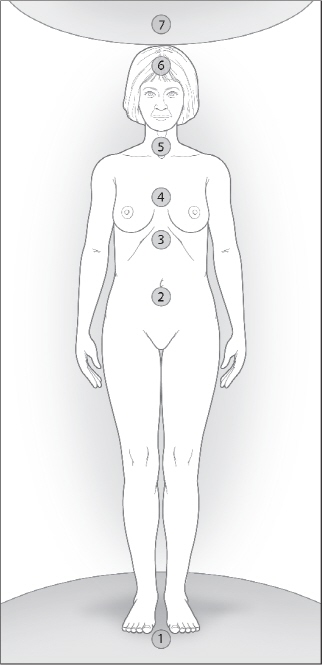Women's Bodies, Women's Wisdom (19 page)
Read Women's Bodies, Women's Wisdom Online
Authors: Christiane Northrup
Tags: #Health; Fitness & Dieting, #Women's Health, #General, #Personal Health, #Professional & Technical, #Medical eBooks, #Specialties, #Obstetrics & Gynecology

Inability to conceive
Inability to launch one’s creations
FIGURE 2: CHAKRA DIAGRAM WITH FEMALE FIGURE

E
NERGY
A
NATOMY:
M
ENTAL AND
E
MOTIONAL
P
ATTERNS
,
THE
C
HAKRAS, AND THE
P
HYSICAL
B
ODY



Sources:
C. Dale,
The Subtle Body: An Encyclopedia of Your Energetic Anatomy
(Boulder, CO: Sounds True, 2009); C. N. Shealy and C. M. Myss,
The Creation of Health: Merging Traditional
Medicine with Intuitive Diagnosis
(Walpole, NH: Stillpoint, 1988). Scientific documentation of the human energy system and updated information from Mona Lisa Schulz, M.D., Ph.D.,
Awakening
Intuition: Using Your Mind-Body Network for Insight and Healing
(New York: Harmony, 1998).
Now that you’ve looked at the table and gotten an overview of the physical problems that can be associated with the various chakras, I’ll discuss the issues of each chakra in more detail.
The First Chakra:
How Family Wounds Are Stored in the Body
Our first-chakra health is related to our upbringing and early life. This includes our immediate and extended family, race, social status, educational level, family legacy, and family expectations as these were handed down through the generations. To describe the breadth of the issues involved in the first chakra, Caroline Myss uses the word
tribe
. For example, we all learn very early what it means to be a member of a defined group: a Smith or a Jones, a Catholic or a Jew. Another first-chakra “inheritance” is the tribal programming of many first-and second-generation immigrant families in the United States, who often pass on the belief that to accomplish anything worthwhile, one must suffer and sacrifice personal happiness and pleasure for the benefit of the next generation. Family scars and the social and familial information that form a person’s idea of reality are connected to the first-chakra area.
The tribal mind is not an individual’s mind. The tribal mind is primarily a collective brain that seeks to hold on to its own and fight for its own survival in the world. The tribal mind is concerned with
loyalty,
not love, kindness, or tenderness. The age-old conflicts in the Middle East are examples of entrenched first-chakra beliefs about who is worthy and who isn’t. What the tribe refers to as “love” is really obligation to the tribe. An example of this is a family member who says to another, “If you really loved me, you’d come to church with me every Sunday.” Tribal conscious ness, then, is not a high-level, highly evolved consciousness. Yet we all share it to some degree, and many women admit that as they get older, they can hear that tribal mind within themselves. Many women say, “I sometimes hear my mother’s words coming right out of my mouth, and I can’t believe it.” Above all, the tribal mind seeks stability by keeping everything the same; for example, family holidays and birthdays become obligations, not joyful times of sharing.
I sometimes refer to the tribal mind as “crabs in the bucket.” If you have a bunch of crabs in a bucket and one crab tries to escape over the edge, the other crabs will always pull the escapee back down with the rest of them. The same sort of thing often happens to women and their families as the women decide to break free from limiting patterns. Almost invariably, family or community members try to sabotage her efforts—at least initially. This is how society keeps its members in line.
Countless women have had the experience of confronting their parents about abuse or incest soon after remembering these events, only to find that their parents deny these allegations outright. The unconscious motive to preserve the tribe is the reason so many par ents deny having ever violated a tribe member. At some level, their tribal memory bank has absorbed the memory very differently from the way the individual member records the same event. The person who is waking up from the tribal trance is almost invariably seen as a “traitor” to the family, the church, or other social group.
FIRST-CHAKRA ISSUES THAT CAN SET THE STAGE FOR ILLNESS
Unfinished business with parents, such as anger or resentment about childhood wounding
Incest (this is a second-chakra issue as well)
Abuse or neglect in childhood
Psychological programming from one’s early years that is limiting, such as:
